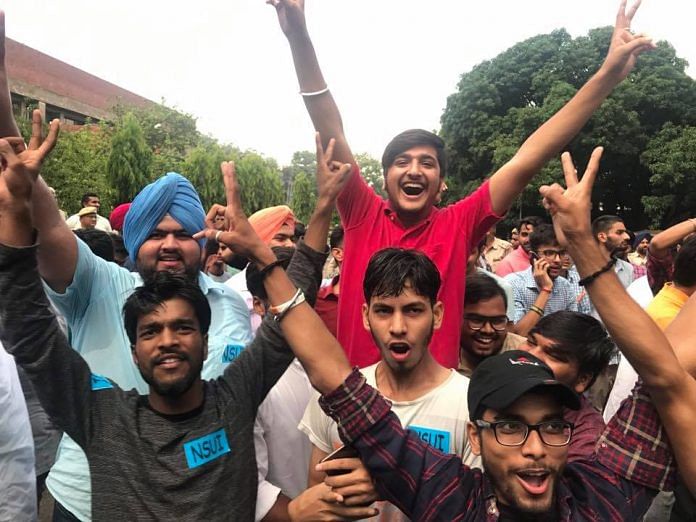Panjab University hasn’t offered much to the student politics; if the heartland follows the same route, things may go worse.
Student elections are back in Punjab after 34 years, and a number of student leaders are thanking chief minister Capt. Amarinder Singh on social media, hoping that they can make a career in politics now.
But here is a note of caution. If student politics plays out the way it does in Panjab University, Chandigarh (the only place where student elections have taken place all these years), then this decision may defeat the very purpose it aimed to serve.
In the ideal world, student bodies are expected to raise the issues of students with the authorities. But the reality is far from this. Fests, tours and star-studded nights are the perks that a student leader lives by. A rally of over 100 big cars lining all the way along the highways showcases the potential of a student leader to buy votes. I have even seen money, drugs and liquor being traded for vote. I have seen people being kidnapped on the day of election (I too had to flee to save myself that day).
And, the only annual drama in the name of student rights is a ritual hunger strike that is called whenever the authorities increase the fees.
There was a time when a female student jumped from the second floor of the hostel. The university put metal grills in the balconies, which made the hostels feel like cages. Every year the student candidates from the political parties come with the slogan of empowering women, but the fact is that even today curfew timings for young women exist while male students can roam free even at 3 am. Not a single woman has been elected to the post of council president, though two had contested. This, in a university where women constitute 75 per cent of the total student population.
A very famous student leader who is a member of a big party and fights elections on the slogan of ‘sincerity, integrity and honesty’ was caught cheating in exams. He has stayed in the university for more than 10 years and continues to be the ‘dada’.
It’s no secret that once this new decision is implemented, students of NSUI, ABVP, SOI and maybe SFS, may get to work on the ground to build a vote bank for their financer — the political party they are affiliated to.
There will be an increase in the number of Bhaias and Didis — people who are no longer college students or have nothing to do with studies but they hang around as friends of first-year students. Student politicians stay in Panjab University for more than 10 years, some even earn a PhD just for the sake of staying and participating in politics and becoming part of the election machine. Student councils are often just puppets of these election machines. When elections will become prevalent everywhere, every academic institution will become an fertile ground or SEZ — special election zones — for these election mafias.
Moreover, when elections are fought over money, power and ego, it is very difficult for ideology to find a foothold.
Punjab has the highest proportion of SC population, but it is also one of the states which spends hardly 1-2 per cent of its budget on the welfare of SCs. This is because politicians have not fought elections on the basis of ideology but on money power. Student leaders do not understand issues of social justice, neither do the state’s politicians. If you observe the alumni of Panjab University who later become politicians later, most of them are actually from wealthy families. Even in the 2017 assembly elections, the student leaders who were given tickets had power, family connections and loads of money to finance it. Thus the idea of student elections shaping the future of politics is indeed true, but only in a perverse way.
It is routine to see people from all over the state descend on the Panjab University campus when the student council elections are underway. They are like migratory birds; they have nothing to do with the students’ problems or the university, but they have money and attitude. They swoop down to enjoy the atmosphere of the election-mela.
Now that campus elections have been allowed all over the state, you will see the same manpower covering different geographies — moving from one university to another.
There’s a famous Punjabi song “Chandigarh reh jooga soona je pinda waalen jatt mud gaye” (Chandigarh will be deserted if the village ‘Jatt’ leaves the city). For sure, after the government’s decision, things will change. Many village students who came to Chandigarh just to get a taste for politics don’t want to go back home and farm. Now that student elections will be held in every college across the state, they will not need to travel all the way to the city and can remain in their villages.
Punjab might have taken a historic step today. But given how the student elections in the capital city have been steeped in dirty, lazy politicking, I will not hold my breath for any big change in the politics-as-usual.



